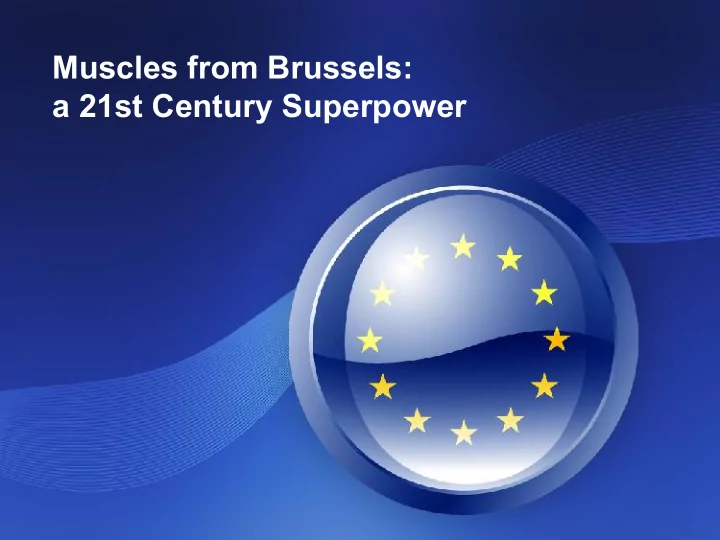

Muscles from Brussels: a 21st Century Superpower
“The European Community, if it were to become politically cohesive, would have the population, resources, economic wealth, technology, and actual and potential military strength to be the preeminent power of the twenty-first century.” Huntington, 1988
The EU Changing balance of power Increasing institutionalisation Changing of IR structure of IPE
The superpowers, 1944
• Images of the two superpowers
• Images of Iraq war / images of GW Bush
• Map/table showing new powers competences
GDP 1,314 1,290 1,101 3,280 13,808 4,382 16,906 ($bn) GDP per 9,703 14,705 2,563 5,325 45,725 33,596 33,800 head ($) % world 2.8 2.11 16.94 19.85 4.53 1.9 7.3 population Source: IMF, 2008
Powers old and new
Views on European influence Source: Globescan & Program on International Policy Attitudes, 2007
The EU Changing structure of IPE
The EU in world trade Source: World Bank
19% world trade 17.1% world trade in goods 26% world trade in services FDI: €172 billion source Second largest €94 billion host importer in the world Largest exporter in the world
Trends in world trade Market shares in world trade, 1992-2004 (%) Source: Eurostat, IMF, all products in value, excluding intra-EU trade
Commission 1 state/ supervised by WTO 1 vote Trade 133 committee Commission full participant 19 EU Economic alongside member OECD member states states; observer governance status for ECB ILO, MEAs, EU member, 1 state/ WHO, FAO, participant or UN 1 vote Codex, ITU, observer agencies WIPO…
Preferential trade arrangements
The euro goes global €-denominated international debt approx 49% of outstanding stock of international bonds and notes Forex: the euro is the second most actively traded currency after the US$ The €–US$ currency pair is the most actively traded pair in global foreign exchange markets (more than 25% of global turnover) More than 26% of global foreign exchange reserves held in €
The EU Increasing institutionalisation of IR
Regionalisation of international relations
The EU in world trade
UNSC and G8 representation Text 1 Text 2 Text 3 Text 4 Text 5 Text 6 France, Germany, Italy, G-8 X X X UK, European Commission, EU Presidency UK & France UNSC X X X members % UN 0.876 1.200 0.450 2.667 26.086 16.624 38.650 budget Source: United Nations, 2008
Defence comparisons Size of armed forces 326 1027 1281 2185 1540 230 2078 (‘000) Defence budget 20.6 32.2 26.5 46.2 552.6 41.0 307.1 (US$bn) Defence expenditure 1.6 1.5 2.3 1.4 4.0 0.9 1.3 as % of GDP Source: International Institute for Strategic Studies, 2009
• Military budget and people in uniform slide
Source: European Union, 2008
Recommend
More recommend